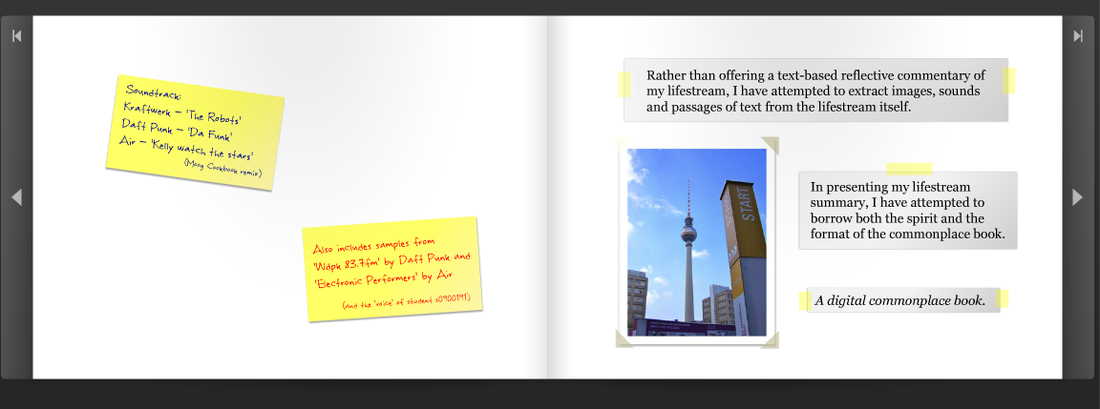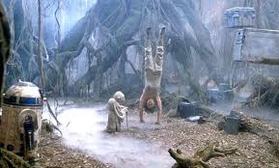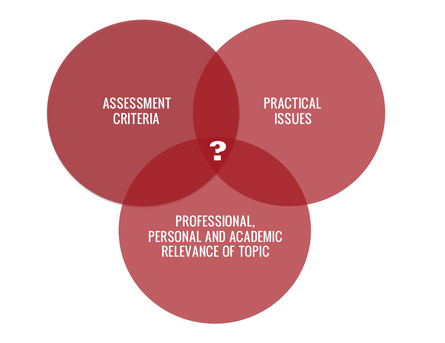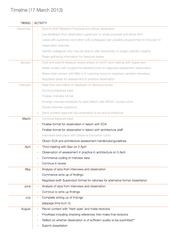|
Not another website. That phrase came into my head earlier this evening. I was giving some more though to how a dissertation could be presented in a non-traditional (i.e. entirely text-based) format. In particular, I was thinking about multimodality, the rationale being to present a dissertation that reflects the nature of my wider participation in the course. Or to put it another way, the dominant themes and tasks during the MSc haven't been concerned with putting text on the page therefore why start now? An obvious choice might be to present the dissertation across a website. I've built a few websites for coursework assignments during the MSc therefore it feels like there would be a certain safety in doing so for the greater task of the dissertation. I recognise that the mode of presentation should be aligned to the content or the subject matter I choose to focus on within the dissertation (I'm thinking about Gunther Kress's 'aptness of mode', here) however a website feels like treading old ground. One idea that may or not be appropriate (but I'm going to record it here anyway) would be to create an online publication/e-book - like the documents I've create in issuu. One that springs to mind is the commonplace book I prepared for the E-Learning and Digital Cultures course. On the one hand, this type of document/resource allows for academic conventions (such as presentation, structure, citations) to be met. At the same time however, it allows for hyperlinks, audio, video, imagery and probably other digital jiggery pokery depending on how much time/money I would be prepared to spend on the software. In terms of structure, it would also be relatively straightforward or consistent with a traditional dissertation. I quite the combination of experimentation, without going so far from the norm that it becomes risky. I've just retrieved the commonplace book I mentioned. In fact it turns out I put two together for the EDC course. The one pictured above is my lifestream summary assignment. I think the screenshot shows how this approach can be seen as multimodal and reflective of some of the strands that have run through my participation on the MSc programme. The presentation of information is visual, textual and aural (the post it note cites sound that accompanies what's on the page. I think it will be interesting to consider whether this could lend itself to a dissertation.
0 Comments
With nice timing, I received an e-mail from Anna today. Like me, Anna is at the dissertation stage of the MSc programme. Unlike me, Anna has started her dissertation and is two weeks in. I had been giving some thought to who else might be at the dissertation stage (I knew Anna was). On each of the courses thus far on the MSc I've found it useful (and enjoyable) to keep in touch with fellow students 'outside of class'. The Dissertation Guide offers the following suggestions with regard to working with our peers:
'...take advantage of the expertise of your fellow students, particularly those who are also at the dissertation stage of their studies...Feedback from a different perspective can often help to focus your thinking and clarify issues central to your research questions.' I replied to Anna to say that, once I'm up-and-running, I will of course be in touch. Anna is amongst the most impressive students I've encountered on the MSc. She has also been one of the most generous and supportive of others. It will be good to work with her once again. Within my e-mail I mentioned that it would have been a loss to the MSc if she had been unable to undertake the dissertation: I was offering encouragement and being completely honest at the same time. Over and above one-to-one contact, I'm aware that there's a dissertation group, accessed via the Course Hub. I don't think I'll join that one until I feel a little more assured in what I'm going to do. I don't think it would be helpful at this stage to see the progress that others are making. Even though I'm not 'behind', in the sense that I have a year to complete the dissertation from the deadline that I agree with my supervisor, I can't see any benefit from hearing that others are moving their ideas forward. Something to add to my things to do list on the right, however. Perhaps most importantly, Anna's e-mail has reminded me - over and above the information in the Course Guide - that the dissertation needn't be quite the isolating experience I had imagined, or at least it doesn't have to be. As the last few weeks have past I've become steadily more anxious about my lack of dissertation progress. I know that it's typical for students to experience inertia at some point in their dissertation, however I've stalled before even moving out of first gear. Perhaps what I've been lacking is some structure. I've genuinely intended to spend more time undertaking background reading and really getting to grips with what's expected, but it hasn't happened for a number of good reasons that I won't explain here. That's not to say I haven't been turning ideas over in my mind - on the contrary, I've spent too much time thinking without focus. It feels like I've wasted time and energy.
In response (and I can't believe I didn't come to this idea before now), I'm going to attempt to kick start my dissertation into action by writing. Using this blog I will record and explore ideas, make plans and reflect on my progress. I don't think I would have made it through the Research Methods course without this approach, hence my surprise at failing to adopt this approach in the dissertation before now. Of course, writing is fine it itself, however I'm going to have to write with purpose and direction and for that I'll need discipline. The dissertation seems such a large and (at the moment) undefined piece of work: perhaps some disciplined writing will lend cohesion and structure to my work, in contrast to the free thinking of the past few weeks. Like so much of what it free, it is ultimately disposable and ends up being discarded. My approach then will be to aim to spend an hour each evening working on my dissertation, primarily through entries in the blog, in the earliest stages at least. This will be in addition to a few hours each Friday afternoon that I have set aside for study, even if that doesn't always quite work to plan. I recognise that enthusiastic input doesn't necessarily result in positive output, however as approaches go, it's better than anything else I can think of and it appeals to my sense of putting a shift in and trying to build momentum. For each of my dissertation ideas thus far, I have anticipated presenting my work in a non-traditional, digital format. In addition to being of personal interest, each of my ideas has seemed suited to presenting work in a format that is multimodal in nature. It's something I've experimented with during the MSc programme and have sometimes found to be exhilarating (and on other occasions, exhausting). It is also something I've been encouraged to think about by members of the course team, over and above the general guidance offered in the Dissertation Guide:
'It is worth stating here that the e-learning programme team is committed, given the technological context of the this area of scholarship, to encouraging any participants who want to submit a dissertation using media other than plan text.' As I understand it, no-one (on the MSc programme) up to this point has submitted a dissertation in a non-traditional format. Considering the experimental nature of the course (and the evident creativity and imagination of participants) this has struck me as odd. It would seem to me that within our field of practice, submitting an entirely text-based dissertation (when there wasn't a requirement to do so) seemed unusual. I wouldn't expect that everyone would want to submittal a digital dissertation, however I would have though that it would have been commonplace. Apparently not, though. An explanation of the possible resistance or reticence towards 'writing up' digitally can be found in the Dissertation Guide however. 'If you do present in an alternative format, your will also need to write a conventional rationale for what you have done. This rationale should be of approximately 2,000 words...should detail for your reasons for adopting a digital formar - reasons based in the literature as as in whatever practical or professional factors are involed' Let's be clear. In my experience, submitting work in a non-traditional format is already more time consuming than than the more traditional text mode (I would say at least double the time, for me at least). Furthermore, the experimental nature is by definition more risky than the long established and accepted presentation of words on the page. And then on top of this, it's necessary to write an additional 2000 word - the length of a typical essay assignment on the MSc programme - that is itself up for scrutiny. I'm still tempted and intrigued by the idea of presenting a digital dissertation, however when the dissertation already comes with time pressures (or as the Dissertation Guide puts it, 'Studying at this level often involves considerable personal sacrifices...great amounts of energy and, at times' even greater amounts of patience.') opting into a supplementary assignment isn't enticing. This isn't to say that I don't recognise the need for a rationale of this kind, only that, alongside other factors it helps to explain why no one has followed this route before. When the stakes are high (and I don't see how an MSc dissertation could be seen in any other way), is it really the time to start taking risks? According to my the timeline I submitted within the dissertation Research Proposal, this being late September, my dissertation should be well underway. Instead I'm at a less advanced stage than I was in April. Good work. I've now abandoned two previous dissertation plans for either re-covering old ground or following a route where I don't feel I have sufficient theoretical grounding (visual methodologies). I'm beginning to think that I approached the research topic the wrong way. In the first instance, I felt under pressure to come up with a topic to satisfy the needs of the Research Methods assignment. That isn't to say that I didn't believe in my original plan at the time, however my proposed research into how the distance education student visualises the university was conservative (and appropriately so considering the general lack of free thinking time I had during the assignment preparation). In hindsight, there was a certain amount of means-to-an-end pragmatism to my proposed research and, to be fair, it worked - I passed the assignment. My second plan (which lifted some of the more interesting elements from the first) would, I felt, sustain my interest. With a bit more thinking time over the summer, I was happy and excited about the idea of a comparison between how the distance education visualises and experiences the university compared to how it is represented in the prospectus and other promotional. An interesting idea but, as I quickly recognised when I met to exlore the idea with Sian, under-rehearsed and lacking a conceptual framework. Third time around I'm taking a different approach and, on reflection, it strikes me that this would have been best all along. It's also the route I've taken with most other courses and assignments so it's a but surprising I didn't reach this stage before now. Rather than trying to conjure up an idea that might work, I've worked through the Dissertation Guide. And then I've re-read it again, highlighting key points. As I do with any piece of coursework, I spent some time considering 'what am I being asked to do here?' The Guide is excellent and makes it seem all the more ridiculous that I was trying to propose a dissertation when I didn't even know what a dissertation was. In particular, I found the suggestion that 'when deciding on a research topic you should have 3 sets of criteria in mind'. For emphasis and clarity, I've presented these in the diagram below. Obviously, creating a diagram isn't a substitute for coming up with a research topic, but at least I've got a better of what I'm trying to do here and for that reason, I feel better about my dissertation than at any time over the last month or so.
|
Categories
All
Archives
October 2013
TimelineOther stuff
|



